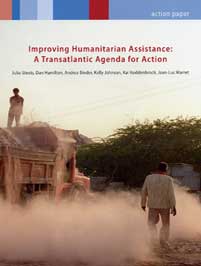Publications
 |
Improving Humanitarian Assistance : A Transatlantic Agenda for Actionpar Julia Steets, Dan Hamilton, Andrea Binder, Kelly Johnson, Kai Koddenbrock, Jean-Luc Marret
GPPi, décembre 2009, 44 p. |
SOMMAIRE
- I. Agenda for Action
- Emergency response and preparedness: A common global challenge
- A critical role for the EU and the U.S.
- Enhancing EU-U.S. cooperation in humanitarian assistance
- A window of opportunity
- Effects of enhanced cooperation
- Recommendation 1: Emphasize informal cooperation, strengthen multilateral channels, and hold high-level bilateral discussions
- Recommendation 2: Improve the capacity of humanitarian donors to implement lessons
- Recommendation 3: Decide on desirability of LRRD. lf desirable, strategically define opportunities and develop better methods to link relief, rehabilitation, and development
- Recommendation 4: Maximize business contributions to humanitarian assistance, while minimizing their risks
- Recommendation 5: Address normative problems of civil-military interaction and improve operational approaches
- II. Supporting Information
- 1. Principles vs. pragmatism: U.S. and EU approaches to humanitarian assistance
- 2. Transatlantic cooperation in humanitarian assistance: current channels, hurdles, and recommendations
- 3. Improving the implementation of lessons learned
- 4. Linking relief, rehabilitation, and development (LRRD)
- 5. Business engagement
- 6. Civil-military relations
-
- About this paper
- About the authors
